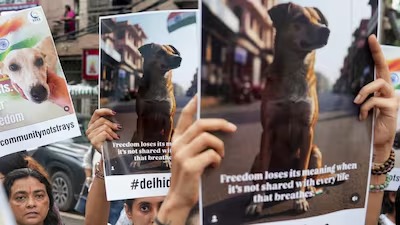
Follow WOWNEWS 24x7 on:

India’s highest court recently reversed its earlier directive to remove all stray dogs from Delhi’s streets and place them in shelters. The decision came after a strong public backlash from animal rights groups and citizens concerned about the welfare of the city’s estimated one million stray dogs. Instead, the Supreme Court has ordered that captured dogs should be sterilized, vaccinated, and returned to their original areas—unless they show signs of rabies or aggression.
Key Takeaways On The Supreme Court’s Revised Stance
The August 11 order to relocate all stray dogs to shelters was found to be too harsh and impractical considering existing infrastructure limitations.
The revised verdict mandates vaccination and sterilization of dogs before releasing them back to where they were captured.
Only dogs exhibiting rabies symptoms or aggressive behavior should be kept in shelters, reducing unnecessary confinement.
To address public health concerns, the court banned feeding dogs on public streets, instructing Municipal Corporations to create designated feeding zones.
NGOs active in the case have been allocated funds to support animal welfare programs but must not hinder official efforts.
The court emphasized that any opposition to municipal officials during the implementation of orders would face action.
A national policy to comprehensively address stray dog management across India is in the works.
Why This Reversal Matters
This ruling attempts to balance public safety and urban hygiene concerns with animal rights and welfare. Delhi and its neighboring regions have witnessed an increase in dog bite cases—nearly 2,000 reported daily in the capital alone—with rabies posing a serious health threat. However, experts argue that humane, evidence-based approaches like sterilization and vaccination are more sustainable than mass removals.
Voices From The Ground
Animal rights activists welcomed the move. Aparna Engupta from Humane World for Animals India described the ruling as “balanced and compassionate.” Maneka Gandhi, a former minister and animal welfare advocate, praised the court’s scientific approach to releasing sterilized dogs back to their original locations.
Looking Ahead
While this ruling offers immediate relief to stray dogs, the court’s call for a consolidated national policy underlines the ongoing complexity of managing India’s growing stray population. Sustainable solutions will require coordination between government bodies, animal welfare organizations, and citizens.
Conclusion
The Supreme Court’s reversal reflects an effort to find a humane, practical middle ground in a contentious issue at the crossroads of public safety and animal welfare. By prioritizing sterilization, vaccination, and responsible management over mass removals, the policy aims to protect communities without compromising the well-being of India’s stray canine population.
Sources: Washington Post, BBC, Times of India, Reuters, Hindustan Times, AP News




